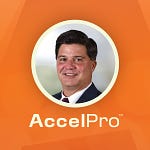Listen on Apple Podcasts, Spotify and YouTube
Welcome to AccelPro IP Law, where we provide expert interviews and coaching to accelerate your professional development. Today we’re featuring Part II of a conversation on copyright transformative use with Professor Ann Bartow.
Bartow is a professor whose work focuses on the intersection between intellectual property law and public policy concerns, privacy and technology law and feminist legal theory.
In part one, Bartow discusses intellectual property law, copyright infringement, Campbell vs. Acuff Rose, Weird Al Yankovic and questions of parody vs. satire.
In this second part of our interview, Bartow discusses parody precedent and the book The Wind Done Gone, Richard Price and appropriation artists and her career path.
This is the second of two episodes with Bartow. Listen to Part I of the conversation here.
Listen on Apple Podcasts, Spotify and YouTube.
Interview References:
Ann Bartow’s American Law Institute profile.
1:57 | Campbell v Acuff-Rose Music, Inc, 9510 U.S. 569 (1994).
2:40 | Suntrust Bank v. Houghton Mifflin Co., 268 F.3d 1257 (11th Circuit 2001).
5:14 | Cariou v. Prince, No. 11-1197-cv (2d Circuit 2013).
Supplemental Materials:
Richard Prince v Suicide Girls in an Instagram price war. (May 27, 2015). The Guardian.
TRANSCRIPT
I. WHY THE WIND DONE GONE MATTERS
Neal Ungerleider, Host: And now, to continue our discussion on Acuff-Rose with Ann Bartow.
Ann Bartow: After Acuff-Rose, a lot of courts really kicked back and had more expansive views of fair use. They entertained the idea of transformative use being really important. One of my very favorite cases that came up, and which the 2 Live Crew case really changed the trajectory of, was a case about a novel called The Wind Done Gone, which was a retelling of the book Gone With The Wind.
Gone with the Wind was famously about the end of the Civil War. A sweeping novel by Margaret Mitchell and a famous movie. Because copyright lasts so long, Margaret Mitchell is long since dead, and the people who actually held the copyright at the time were SunTrust Bank. The bank held the copyright, and there was a Vanderbilt English professor named Alice Randall who wrote this novel called The Wind Done Gone. And what she wanted to do is look at the story of The Wind Done Gone and ask, “What were the slaves thinking?”
Her novel is about what the slaves were thinking while this was all going on. They're just minor characters in Gone With The Wind, but they are the main characters in The Wind Done Gone. I think from every aspect this is a great book, but then SunTrust Bank decided she was somehow infringing the copyright of Gone With The Wind.
If you even compare the two books, it’s preposterous. Gone With The Wind will give you a hernia but The Wind Done Gone is a 200-300 page novel that is much better, a faster read, never mentions the characters, and doesn't steal the plot other than the Civil War, which is not owned by Margaret Mitchell.
So Randall wrote this novel, got sued, and it wasn't going too well. After 2 Live Crew, the Court had to back off and say, “This is acceptable,” and they did it the same way. They said it was a parody. Under no definition except copyright fair use would you ever think it was a parody. To overcome that unease, the publishers literally took copies of the book and slapped a pink sticker on it that said “This is a parody.” That was the way they handled it, and it was really good.
Then we get to appropriation artists. Appropriation artists go about it a little differently than Alice Randall, whose work I thought was genius. They take other people's work and make changes; some of them make very minor changes to other people's work. But then, in a sort of trademark rather than copyright phenomenon, they would put their famous name on someone else's work after having appropriated it and sell it for a lot of money.
There's this appropriation artist named Richard Price who's very famous and makes a lot of money. One of the things he did that got a bit of a negative attention involved these women who were selling all kinds of art photographs, and they called themselves the SuicideGirls. They would dress up in costumes, very artfully, and a lot of work was put into it.
It's not my kind of thing, but what they did, they did very well. They would sell them for like 80 or 90 dollars a pop, and were making some money doing this. Then Richard Price bought them up. Literally just mounted them and signed his name. Then they were suddenly selling for tens of thousands of dollars. All that excess was just the trademark value of having Richard Price's name on there.
From a copyright standpoint, an ethical standpoint, and many other standpoints, that's uncomfortable. It's uncomfortable for me and the courts. Eventually, in a different case, the Second Circuit went out on a limb and found a situation where some very minor changes to some photographs taken of people in Jamaica were found to be fair use, but it was very contentious. I wasn't surprised when the Supreme Court in the Warhol case backed off a little.
I don't want to talk too much about the Warhol case because it's very speculative what the impact is going to be. We aren’t sure if the courts are going to stick with a strong transformative use approach that allows newcomers to take old works and do something with them, maybe reigning in some of the more outlier appropriation art. Potential infractions are something my other law professor friends and I like to debate, but I don't want to go too far out on a limb. I think there's a lot of potential moves the courts could make from here.
It is a very interesting and maybe unnerving time in the litigation of fair use cases.It's not like the 2 Live Crew case where one person said, “Okay, forget it. We're just going to make our statement and let the lawyers figure it out.” And I love 2 Live Crew for that. I wish I had been their copyright lawyer. That would be the highlight of my career. I actually have a friend who was involved, Lydia Pallas Loren, who’s on the faculty at Lewis and Clark in Portland, Oregon. I think she litigated a piece of that case and she was involved with some other copyright litigation at the time. It's fun having friends that can sometimes give you— nothing privileged, of course—a little scuttlebutt or background to what was going on. That's one of the fun things about my profession.
NU: From a legal perspective, are there any changes to approaches for transformative use now that the barrier to entry for doing a parody has dropped?
AB: You mean that it's easier to make transformative uses - that's true. It’s hard to tell if the ease of technology and production will change things. On the one hand, there's more transformative works out there. I'm always happy to see more works, though that’s maybe harder to police for copyright holders.
On the other hand, why bother? Most transformative use doesn’t really hurt you. People want to talk about moral rights, “Oh, they offended me by doing something with my words.” Get over it. I'm a law professor. I write law review articles where I put my opinions out there. And people come back with, “This is stupid. You are wrong. Get over yourself.” That's just the rough and tumble of debating law.
I think there needs to be that attitude, whatever it is you do creatively, that sometimes people will like your work so much they'll copy it. Maybe, unless it's costing you money, you just take the compliment if you can and roll with it.
Other times, they want to insult you and mock you. We live in a country with a fairly strong preservation of free speech in many contexts. I don't like it when copyright interferes with that. I'm happy to see transformative views push back on that, even if some people get a little offended by it.
—
II. THE PATH TO IP AND COPYRIGHT LAW
NU: Shifting gears, what was your path to IP and copyright law like?
AB: That's a great question. When I got out of college, I had no idea what I wanted to do.
But after a couple of years in the real world, I volunteered with some immigration lawyers in Boston. I thought, wow, maybe I do want to go to law school and do something that can help people like immigration law. So I went to law school.
One of my good friends, Russell Hollander, works for the Director's Guild. He’s had a long career there. At the time, he was working for a union. And he said, “Come on, go to law school. Work with me. We're going to work for a union.” I was really jazzed up about that. But this was the mid 1980s and unions weren't really hiring.
So I figured in my second year of law school that finding a job with a union was going to be a task. I thought, what's my favorite course? What's my B plan? My favorite course at the time was, wait for it, copyright law. I was taking copyright law with Professor Robert Gorman at the University of Pennsylvania School of Law. It was just one of those experiences where it all clicked for me.
The reading made sense; he's a great teacher too, but the material felt really comfortable and fun. I thought this is interesting. Are there other intellectual property courses at this law school? And it turned out there were: trademark law and patent law.
The only reason they were into offering these courses is because of Herb Schwartz, and I think his law firm was Fish & Neave at the time. His daughter, Wendy Schwartz, was in my class at law school. He would take the train down from New York, see his daughter, and then teach the class once a week. I got to learn intellectual property law in the classes.
Then I took a job with a firm in San Francisco, because I thought this is my shot to try California. I graduated from law school and got a job offer from this great firm called McCutchen, Doyle, Brown and Enersen. They would let you rotate through different practice areas to find out what you liked. They asked, “What's interesting to you? What do you like?” It turned out that the firm had a huge defense tort law practice where they did a lot of tort law defense for automobile companies. They knew the federal courts and they knew how to litigate. That was really the most important thing.
But none of them knew anything about patent law. They said, “You took patent law, come work with us.” I was trying to teach them about patent law and they were trying to teach me about litigation. And we wound up representing a tiny company called Cetus in a lawsuit against a company you've probably heard of called DuPont.
Cetus had a patent in an invention called the Polymerase Chain Reaction. It was invented by a guy named Kary Mullis, who won the Nobel Prize later. One of the great ironies and joys of my life is that I got to know Kary Mullis as part of the litigation team that defended the patent. Proof that the patent was valid became very important for Cetus and the team, and I think it was the right outcome. I was very invested. It was fun to work for a case you could really believe in.
Of course, I'm talking about patent law, not copyright law. When I did the patent law, the firm also did some copyright work. They were so happy to have somebody who knew a little bit about patent law and wanted to do it. I never rotated. I spent my whole time at the firm working with the patent law folks, who were fabulous.
I'm still friends with many of the people I worked with at that firm, and we know we had something special. I don't want to go too far overboard, but it was amazingly collegial for a big firm. People really helped each other out, and became friends; these are lasting friendships that are still in place.
Because of my patent litigation background, patent law was really heating up when I decided to try for a career in teaching. This was the early 1990s. They were looking for people who could teach patent law. There are two kinds of entry points into patent law. One is for people with science backgrounds who want to draft patents and prosecute them; they become patent agents and patent lawyers.
You're a patent agent if you're a scientist and you write patents but you don't have a law degree. If you have a scientific degree and you want to write patents you can sit for the patent bar and become a patent lawyer. But patent agents can sit for the patent bar. People think because it's got the word bar in it, you can't do it without a law degree, but you can. You can sit for the patent bar and become a patent agent.
But if you have a law degree, you become a patent lawyer. That's a pretty cool job. I didn't really ever do that because I don't have a scientific background. The other end is litigation. With patent litigation, you need to know patent law, and you need to understand and not be afraid of science and technology, that's the litigation side. I was really excited about teaching patent litigation because I had this great background.
Getting back to intellectual property law, with patent law, I came up in the 1990s against what I at least interpreted as sexism. The idea that it was just hard for women to elbow their way into teaching patent law. This was weird because some of the best patent law professors in the country were women; it was just this oddball thing. So at NYU Law School, women like Diane Zimmerman and Rochelle Dreyfuss, they said, “IP is this weird backwater thing. Why don't you ladies tackle it?”
They were brilliant women. We call them the founding mothers of IP and they made room for other women. The theory was, if you teach patent law, you ought to be able to teach copyright law. This was strange because they don't really have anything in common. I guess the mentality was that there was some fungibility. I love intellectual property law, generally.
My favorite people tend to be scientists and engineers and creatives. If you do intellectual property law, these are some of the folks you get to work with. The fun thing about copyright is that it's complicated and counterintuitive. You can have a lot of songs and pictures and different things for visual exhibits when you teach. So that makes it a lot of fun to teach.
—
III. ON TEACHING IN CHINA
AB: I've taught copyright law all over the world. I teach regularly in China. I know people sometimes roll their eyes and think that China doesn't respect copyright laws. They could not be more wrong.
China has a different view of copyright law than the United States view, but the folks there are just as interested as people in the United States about having domestic creative industries. They want successful Chinese musicians and they understand that copyright has a role in that. The same goes with plays and movies and video games.
There are huge industries in China that have the same needs and interests as industries in other countries. They're trying to navigate that. I was a Fulbright scholar in China for a year and lived in Shanghai. As part of my Fulbright program, they would encourage you to travel around China and give these Fulbright lectures to other law schools all around China.
They had four topics they could choose from that I would lecture on, and people in China are very interested in copyright. Unfortunately for me, I'm not really great at languages. I have to rely on translations of Chinese law, of which there are not enough. So I wind up going there to teach. I know a lot about U.S. copyright law, and so do the faculty there. The students are interested in hearing about it from Americans, but I learned just as much from them when I asked “How does this work in China?”
NOTE: Find Part I of the AccelPro conversation with Ann Bartow here.
Listen on Apple Podcasts, Spotify and YouTube.
This AccelPro audio transcript has been edited and organized for clarity. This interview was recorded on November 30, 2023.
AccelPro’s expert interviews and coaching accelerate your professional development. Our mission is to improve your day-to-day job performance and make your career goals achievable.
Please send your comments and career questions to questions@joinaccelpro.com. You can also call us at 614-642-2235.
If your colleagues in any sector of the IP law field might be interested, please let them know about AccelPro. As our community grows, it grows more useful for its members.












